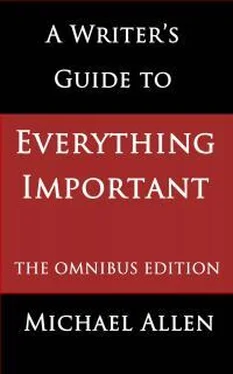Earlier in this section I wrote, in reference to the Concise Oxford Dictionary , that ‘there are a number of useful appendices’; and it may have occurred to you to wonder whether I should have written ‘there is a number’. If so, read Gowers’s discussion of the subject in his chapter on the handling of words.
There are many more books on the use of English that you could read, and possess, with advantage.
It pains me to say so, since I’m a Cambridge man, but it is generally held that the Oxford reference books constitute the highest authority on the use of the English language; which is why some Oxford reference books are listed above. But if you’re an American you may well prefer to use Webster’s dictionary, Strunk and White’s The Elements of Style , and so forth. I shan’t complain if you do. The point is, you need somewhere to go to if you aren’t quite sure.
There are also a couple of American books on language will are worth reading whatever your nationality. Bill Walsh’s Lapsing into a Comma comes from the world of newspapers; and Carol Fisher Saller’s The Subversive Copy Editor is an offshoot of the Chicago Manual of Style.
Lest you be in any doubt, let me say in conclusion that the whole purpose of writing something down is to communicate it to other people. And therefore you need always to bear in mind what people will understand best.
Amateur grammarians and pedants will often insist, for instance, that the word ‘aggravate’ means to make worse, as in ‘I aggravated my ankle injury by running for the bus.’ But during the whole of my life, loads of people have been using the verb aggravate to mean irritate or annoy. ‘I find him very aggravating,’ they might say, of a man who keeps harping on about spelling and punctuation.
There comes a point, I’m afraid, when it is no good ignoring common usage. Common usage is never wrong, even when it’s ‘incorrect’ according to grammarians. And the point of your choice of words, as can hardly be said too often, is to make sure that you say what you mean.
By the way, just in passing, I once wrote a short story about a pedantic retired schoolteacher. It is entitled Say What You Mean! , and it’s available as a Kindle ebook. It might entertain you. Click on the Look Inside facility to see how it begins.
12. Improving your readability
Section 8, on readability, reveals the fairly obvious point that readability, however calculated, depends basically upon the length of your sentences and the number of complex words that you use.
The way to make your style as effective as possible is therefore to match the readability of the text with the level of understanding that you expect to find among your target readership.
Duh, I hear someone muttering. But it’s not as duh as all that. Witness the following.
A good many years ago, a man called Harold Wilson was Prime Minister of the UK. He was the Leader of the Labour party, which has traditionally represented the working class in the UK. Coming from a modest background himself, he was the kind of man who polished his own shoes even when in 10 Downing Street. He also wrote his own speeches.
Wilson undoubtedly had a brilliant mind, and before becoming a Member of Parliament he was a lecturer at Oxford University. Not surprisingly, he wrote as you would expect an Oxford don to write, in long, complicated sentences, with clause piling upon clause.
In 1975 Wilson was leader of the Labour Party, and he naturally gave a key speech at the Party’s annual conference. I ran part of that speech through the online fog index, and the result was 15.17. In other words, Wilson was writing in a style which was not ideally suited to communicating with his party; the majority of members of the Labour party had left school at the age of 15 or 16.
Presumably, Wilson himself had never heard of the fog index, and presumably no one on his team had either. And if it had been put to him that his style should be made much simpler, in order to drive home the points that he wanted to make, then he might or might not have been receptive.
Today, I would hope and expect that the situation would be very different, particularly in the United States, where speech-writing seems to be a recognised job in the political sphere.
But let’s return to the consideration of fiction. There are, as you well know, quite a number of basic genres, and numerous sub-genres within the basic categories. In crime, for instance, you have police procedurals, private-eye books, cozy mysteries, and no doubt a couple of dozen others. You and I could probably sit down and do a rough calculation of the number of years of education that you would expect the average reader of a particular sub-genre to have. It wouldn’t be too difficult to find some anecdotal evidence, and with a bit of luck you might even be able to google up some actual survey data, produced by a keen academic.
I hope you get the point. And at this juncture, please allow me to repeat here a conviction that I have put into print on numerous occasions. It is this.
In my opinion there is no hierarchy of fiction. Speaking metaphorically, there is no skyscraper of fiction, with the valuable, ever-to-be-preserved masterpieces of the literary genre at the top – and, of course, the trashy, vulgar, no-good pulp-fiction crap at the bottom.
In the hierarchy representation of the range of fiction, literary fiction is written and read mostly by men – because they possess all the brains and refined sensibilities in this world, don’t they? – and the basement-bound crap is written and read by women.
Such, at any rate, is implied by the hierarchy model. It is a phallic concept. And for the umpteenth time I hereby renounce and deny any sound sense in that model. It is an idea which, to forestall further discussion and stress to my peace of mind, I declare to be braindead. (First draft said full of shit, but I wouldn’t want to upset anyone.).
The best way to think of the range of fiction, with its multiplicity of readers of all ages and years of education, is as a street full of bookshops. Each bookshop offers a particular variety of fiction, and each bookshop, broadly speaking, will cater for a particular type of reader. Your job, as a writer, is to choose your genre and bookshop, and to find out, by one means or another, how to communicate with those readers through an appropriate style; preferably a style which you can write in fluently and without causing yourself any great effort.
Since the Harold Wilson example indicates that even quite smart people can still overlook this simple step, I’ll spell it out a bit further.
Given that we can get quite a good idea of the readability of text, through the Gunning fog index, the smart way to proceed is to test the fog-index rating of half a dozen of your favourite writers in whatever genre you intend to work in. Then you seek to match your own style to that target.
Let me remind you of Ed Murrow’s comment. Short sentences are not a secret. And I don’t think Ed Murrow was ever accused of dumbing down.
PART 4: Using style to reveal character
13. How not to do it – the stream of consciousness technique
Yes, it is certainly the case that sometimes you can enhance your writing by adopting a particular style, or by using what might be called a narrative technique. By ‘enhance’ I mean that, if you have found an appropriately receptive reader, a particular style will help to hold your reader’s attention to the narrative flow, and will intensify the emotion felt by the reader as the events unfold.
However, I’m going to start by advising you to avoid some of the more extreme stylistic and/or technical devices of the literary fraternity.
Читать дальше












